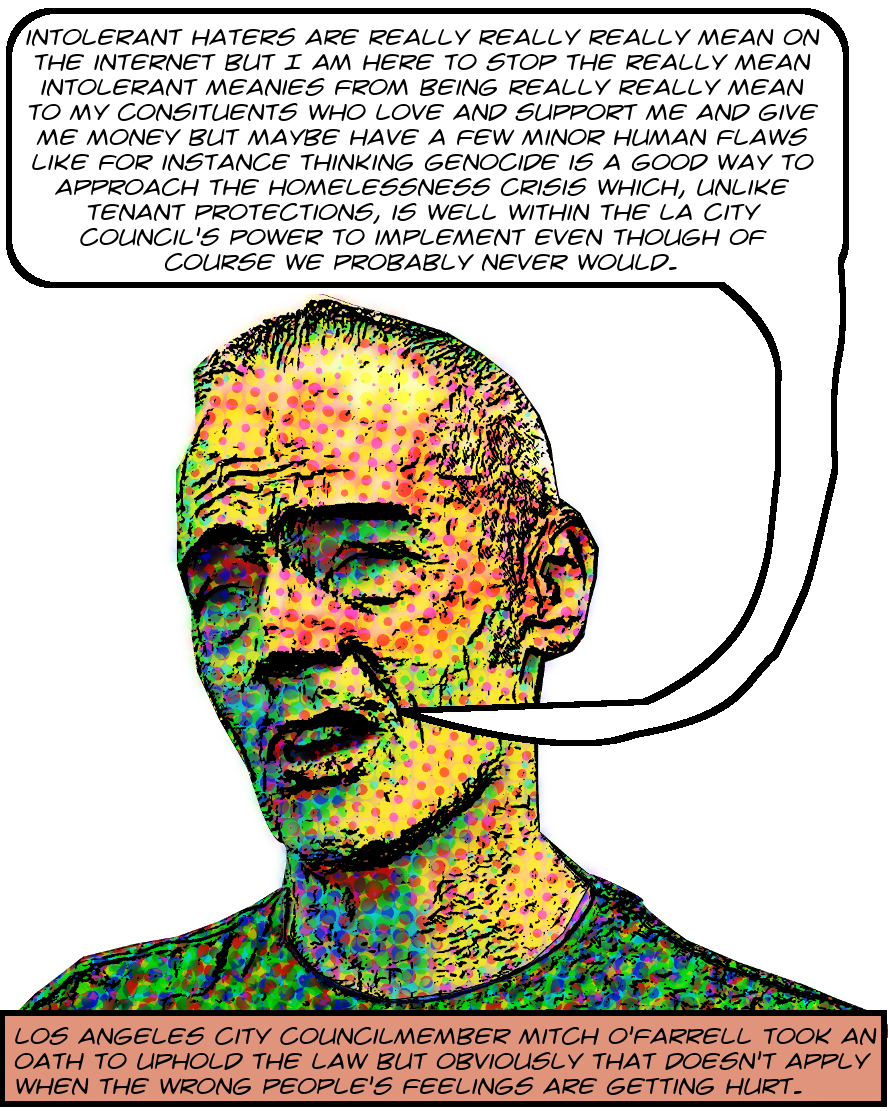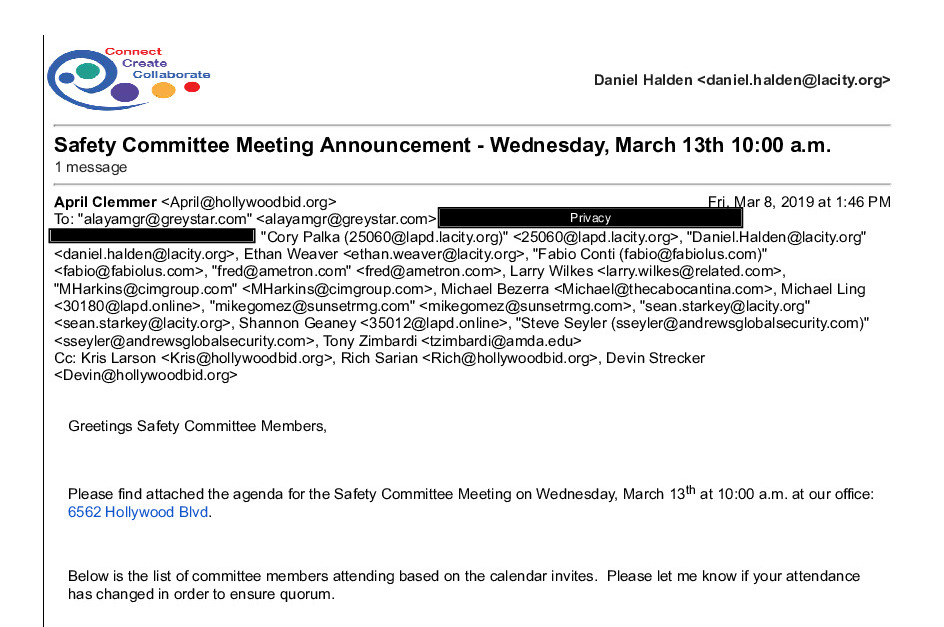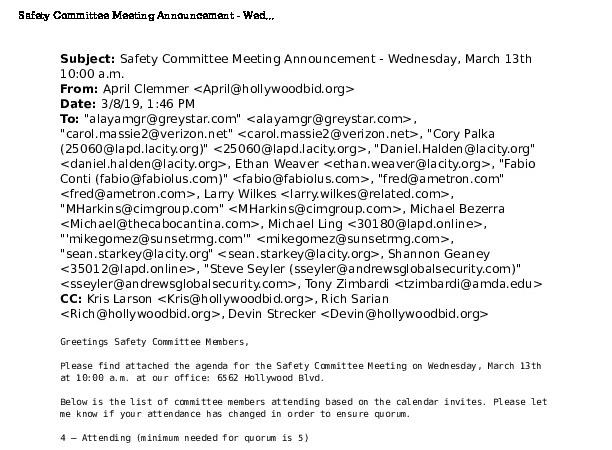Here’s another installment in my ongoing series of posts about the City of Los Angeles and the interesting ways in which its various departments violate the California Public Records Act.1 Today I’m looking once again at Los Angeles City Council District 13, repped by the fecklessly idiotic troll doll Mitch O’Farrell, and some of O’Farrell’s illegal email redaction policies.2 The story actually begins last March.
At that time I received some emails from CD13 containing conversations between staffers, LAPD officers, and local owners of commercial properties about homelessness. The discussions were filled with dehumanizing stereotypes and calls to starve the homeless, to use pressure-washing and illegal planter placement and other hostile measures to displace them, and so on. All of this not just uncriticized, not just accepted, but actively encouraged and facilitated by City staff and LAPD officers.
I found the whole scene appalling and wrote a number of posts exposing these privilege-addled sociopaths, the main one of which is here but this other one about Kanye West flunky Anthony Kilhoffer is also good. Some of them flipped out and threatened me and apparently others complained to CD13 that I had exposed their sociopathy to the world or that I was mean to them on the internet or whatever. Since then, clearly in response, CD13 has redacted email addresses of basically every correspondent who’s not using a government email address.3
Dan Halden, who’s responsible for handling some of my CD13 CPRA requests,4 has told me that such redactions are legally justified because exposing constituents to personal mockery for advocating genocide against the homeless would create a chilling effect on their willingness to contact their elected officials. Here’s one instance of Halden’s articulation of this novel5 legal theory:
On behalf of CD13, I made the decision to redact or withhold information pursuant to Government Code Section 6255. The redactions that were made pertained to the personal information of constituents. Full disclosure of their personal information would have a chilling effect upon citizens reaching out to their elected representatives for assistance. Therefore, the public interest in nondisclosure outweighs the public interest in disclosure.
That certainly sounds all legalistic and stuff, but the CPRA’s very clear that local agencies can’t just make up reasons for redacting or withholding records. Instead, agencies who intend to withhold or redact records are required to justify their decision by citing explicit sections of the law, of which precisely none justify redacting information to prevent public mockery of people. That requirement is found at §6255(a), the very section which Halden cites to justify his redactions. It says:
“The agency shall justify withholding any record by demonstrating that the record in question is exempt under express provisions of this chapter or that on the facts of the particular case the public interest served by not disclosing the record clearly outweighs the public interest served by disclosure of the record.”
And it’s that last clause, the so-called “catch-all exemption,” that Halden’s relying on to redact the names of O’Farrell’s various psychopathic correspondents. The legislature realized that situations might come up where the release of certain information might have genuinely harmful consequences and yet would still be required by the law because they’d failed to foresee the possibility.
For instance, the CPRA was written before computers had become ubiquitous. Without a clause like this agencies could have been required to release computer passwords on request until the legislature had had time to act by framing specific language exempting this. The clause is clearly necessary. Even the California State Legislature can’t see the future! But it is the single most abused section of this much-abused law.
Agencies, like Halden is doing here, use it to redact or withhold all kinds of information that the legislature obviously considered and chose not to exempt. We can be sure that the legislature thought of the very issue Halden’s relying on here because §6254(l) specifically exempts constituent correspondence with the Governor. If they’d wanted to exempt correspondence with local electeds they would have done so.
But that’s not all. It’s important to note that that catch-all exemption doesn’t give local agencies free rein. Before it can be used to withhold information the agency must establish that the public interest in releasing the information is “clearly outweighed” by the public interest in withholding it. That is, Halden says there’s some public interest in morons like Anthony Kilhoffer feeling perfectly free to ask O’Farrell to kill off homeless people by relocating them because they’re lowering the rent he can charge for his investment properties without having to worry about being publicly exposed.
And maybe there is some public interest in that. But there’s a lot of public interest in understanding who has the ear of elected officials, who they listen to, who they’re willing to meet with. Without knowing the names of the people asking for help it’s impossible to understand who gets help and why they get it. Does the public interest in keeping Anthony Kilhoffer’s secrets CLEARLY outweigh that interest? Doubtful.
But that’s still not the end of Halden’s errors.6 Remember that before I mocked O’Farrell’s sociopathic housedweller constituents CD13 never redacted this kind of information. The policy is purely a reaction to my use of public records or to what CD13 anticipates I’m going to use the records for. And that in itself is forbidden by the CPRA at §6257.5, which tells us that [t]his chapter does not allow limitations on access to a public record based upon the purpose for which the record is being requested, if the record is otherwise subject to disclosure.
And there’s more! Halden is famous for whining about how long it takes him to deal with my requests even though he actually just leaves them lying around untouched for month after month after month and then zips through them in a few hours after I hassle him enough. And in order to be able to zip through them he has had to develop redaction criteria that are easy for him to apply.
And in the case of these redactions of putatively personal information his system seems to be that he redacts names and email addresses of anyone using an internet service provider or free service for email, e.g. Gmail or SBC Global. This leads him into grave error, though. For instance, take a look at this email from March 1, 2019 announcing a meeting of the Hollywood Property Owners’ Alliance Safety Committee. Look at the end of the post for images of this and another relevant email.
In the first place this email was sent to Dan Halden by someone who does not work for the City of Los Angeles.7 Thus the recipients of the email couldn’t reasonably feel reluctant to ask Mitch O’Farrell for help murdering homeless residents based on their names being on this list. O’Farrell had nothing to do with putting them on there and they’re not on there because of their communications with O’Farrell’s office. Halden’s excuse for redaction cannot possibly apply here.
But it gets worse. Take a look at this unredacted version of the same email. This shows us that the person whose information Halden redacted here is Carol Massie, who is a member of the board of directors of the Hollywood Property Owners’ Association. He redacted her email address, which is carol.massie2@verizon.net. First of all, she’s not O’Farrell’s constituent. She and her husband Trip Reeb8 live at 15205 Via De Las Olas in the Palisades. This is in CD11. Not only that, but she’s on the board of directors of a BID.
The BID is subject to the Brown Act and the CPRA. Board members emails and email addresses are explicitly not exempt per the CPRA at §6254.3(b). However, the redaction still does make some sense. Massie is famous for her appalling racist rage-rants about dark-skinned poor people daring to come to Hollywood and have fun. She also hates Peruvians. So yes, it’s true that I have mocked Carol Massie on the internet. No doubt I will mock her again.
But what’s Halden’s reason for redacting her email address here? I asked him but he will not answer. Ultimately, though, it doesn’t matter. There’s no explicit authority in the CPRA for redacting it and any argument based on public interest in withholding must fail because she’s a member of a legislative body subject to the Brown Act. Tracking the activities of people in Carol Massie’s position is the whole point of the Public Records Act.
It’s not only the point of the Public Records Act, but it’s why the people of California made government compliance with the Public Records Act a fundamental constitutional right.9 It’s not just the law that O’Farrell and his flunkies are violating here, it’s the freaking Constitution of California. The very same Constitution that Mitch O’Farrell swore an oath to uphold,10 an oath which he seems unwilling or unable to live up to. An oath with which it seems reasonable enough to end this post, since the point has been made repeatedly:
I do solemnly swear (or affirm, as the case may be) that I will support the Constitution of the United States and the Constitution of the State of California and the Charter of the City of Los Angeles, and that I will faithfully discharge the duties of the office of (here inserting the name of the office) according to the best of my ability.
Image of Mitch O’Freaking Farrell is ©2020 MichaelKohlhaas.Org and I clipped it from some long-forgotten YouTube monstrosity that I can no longer be arsed to look up but I’m sure a little Google-fu will lead you to what you seek if you seek it with a full heart and so on.
- I mean that the ways I’m writing about are the interesting ways in which the City of LA violates the CPRA. Most of the ways aren’t interesting at all. They’re routine, banal, and boring, although obviously reprehensible and intolerable. It’s still important to write about them extensively and often but only in court pleadings, not here.
- It’s sad but true that not only are the ways in which the City of Los Angeles violates the CPRA inexhaustible as suitable topics, but the ways in which CD13 violates it are also inexhaustible. In fact, the many, many ways in which CD13 violates the CPRA’s redaction requirements is itself an inexhaustible source. They’re not only illegal, by the way, but embarrassingly illegal. What one chooses to hide may reveal more than what one reveals.
- This is a slight exaggeration but very slight.
- At this point it’s impossible to tell who handles CPRA matters at CD13. Basically I think their official procedure is that whoever I personally send requests to is the wrong person and I have to be explained to endlessly about the new procedure, which is completely different from whatever I just did, before being made to resubmit the request to another person or through another platform or whatever. Your mileage may vary.
- Calling a legal theory “novel” is the lawyerly equivalent of the famous and potentially even semi-accurate folk theory on the subtextual meaning of “bless your heart” when used by folks from certain geographical regions of the United States.
- Probably they’re not really errors. I doubt that Halden made any effort whatsoever to understand the requirements of the law and to abide by them as he understood them. Instead it’s much more likely that O’Farrell asked the City Attorney to come up with a story that, when presented to a judge, wouldn’t make it completely obvious that they were setting out to break the law. Judges are incredibly deferential to City agencies, so it’s not necessary for any of Halden’s communications to make sense as long as they don’t say out loud that they know they’re breaking the law. In that sense Halden’s assertions aren’t in error. He’s not trying to speak the truth. Like Joseph Goebbels, he’s not speaking to convey facts but to create a certain impression, and he’s creating the intended impression. (I read somewhere that Goebbels said that and since then I cannot find it again anywhere. Surely its attribution to him is completely made up. That don’t mean it’s wrong, though, so I’m going to keep using it.)
- Don’t get me started about BIDs and whether their staffers work for the City of Los Angeles. I think they do. The City says they don’t. I’m speaking here from Halden’s point of view.
- Zillionaire names, how do they fucking work??
- See the Constitution of California at Article I §3(b)(7), which says: ” In order to ensure public access to the meetings of public bodies and the writings of public officials and agencies, as specified in paragraph (1), each local agency is hereby required to comply with the California Public Records Act”.
- See the City Charter at §215.



